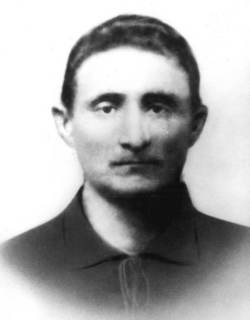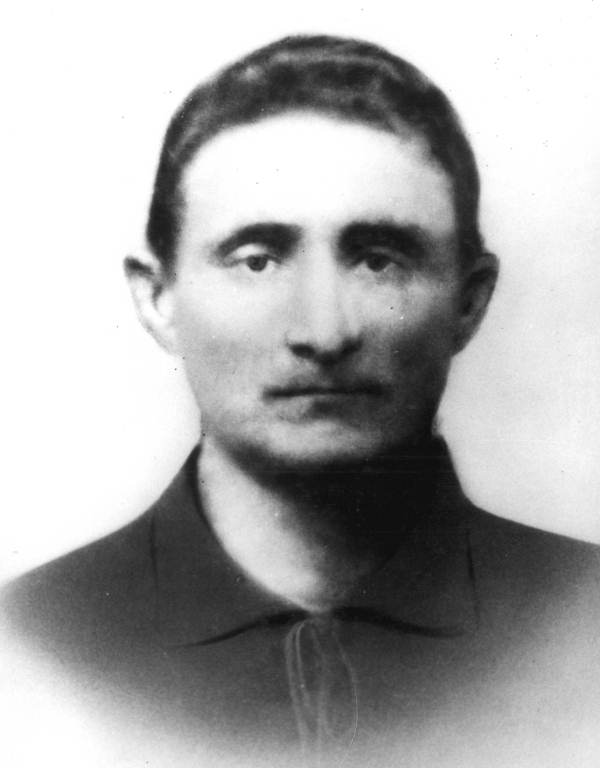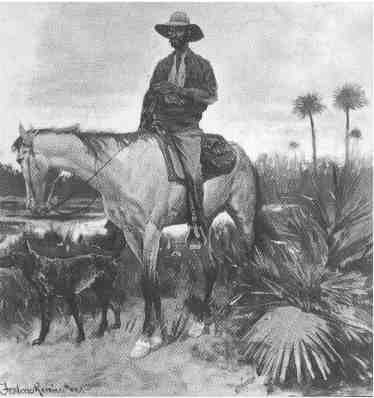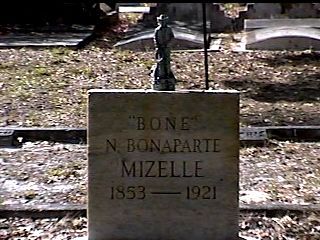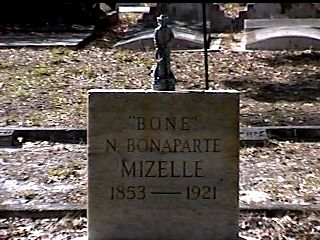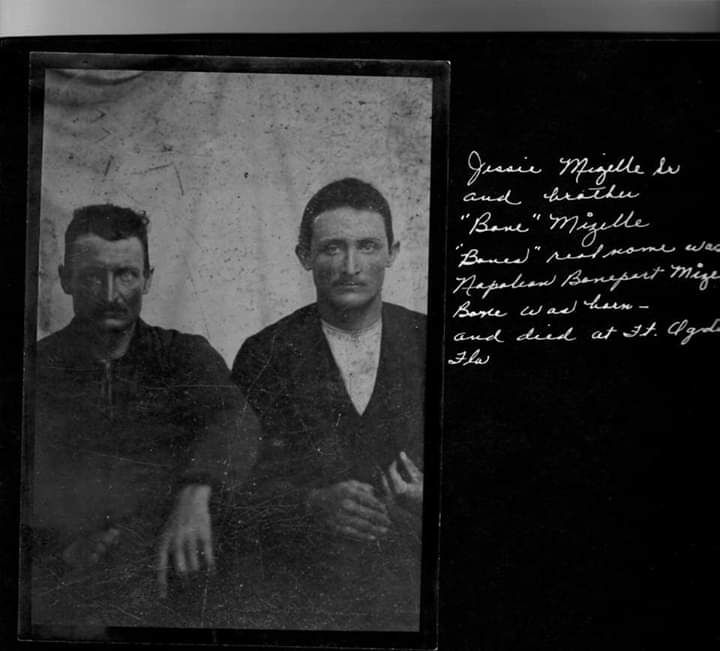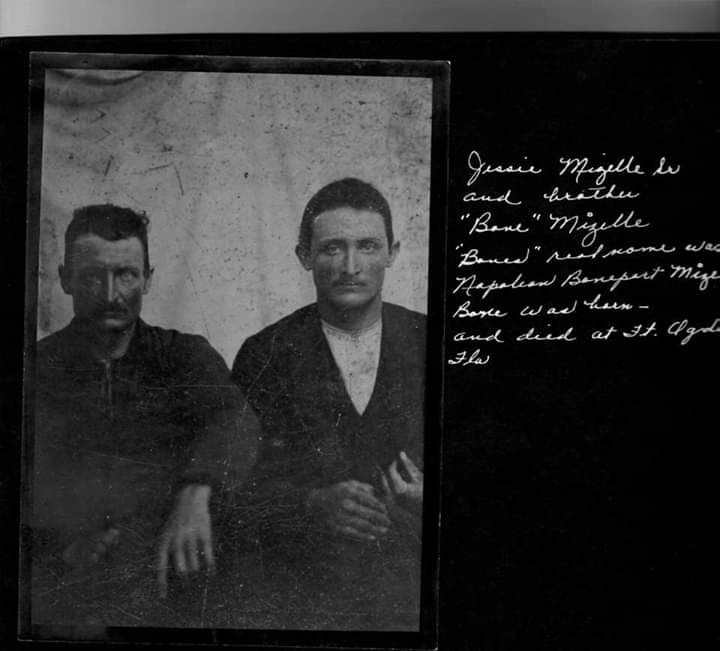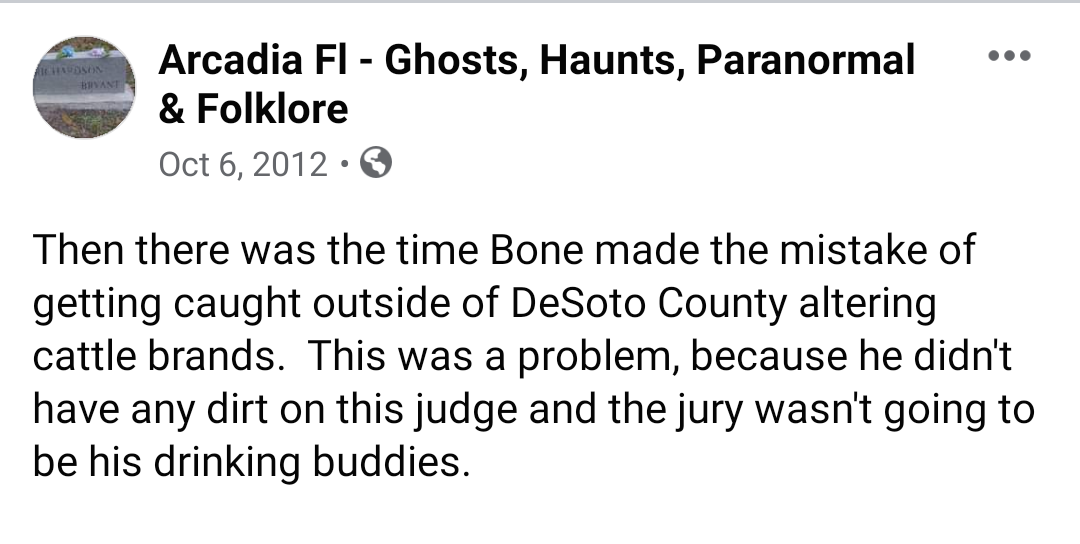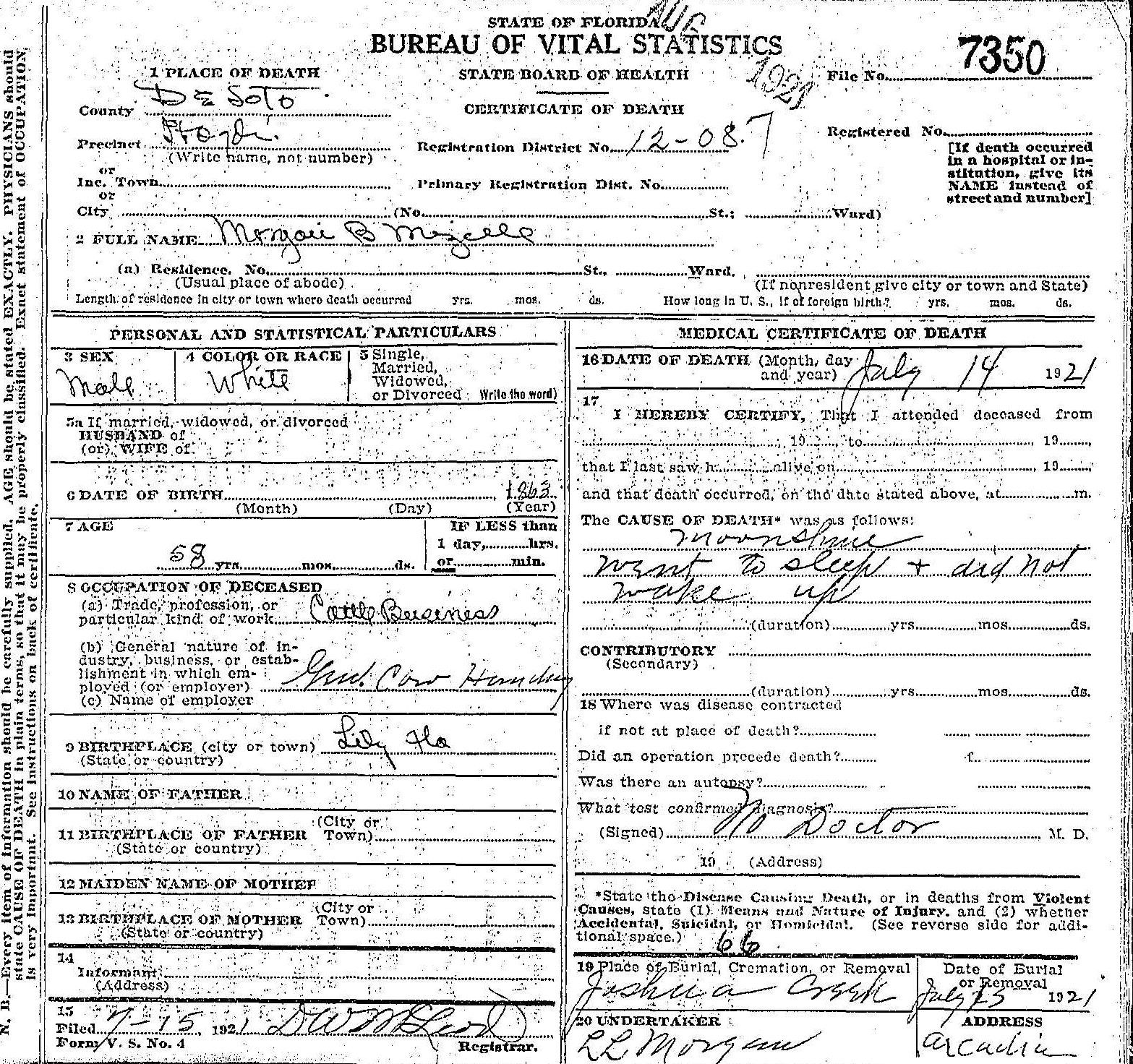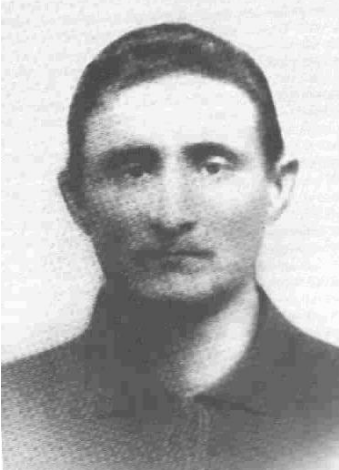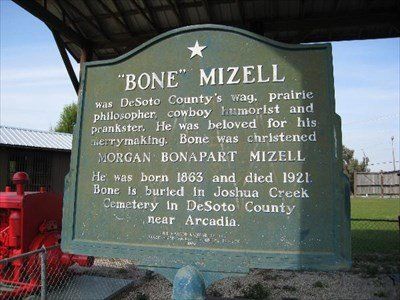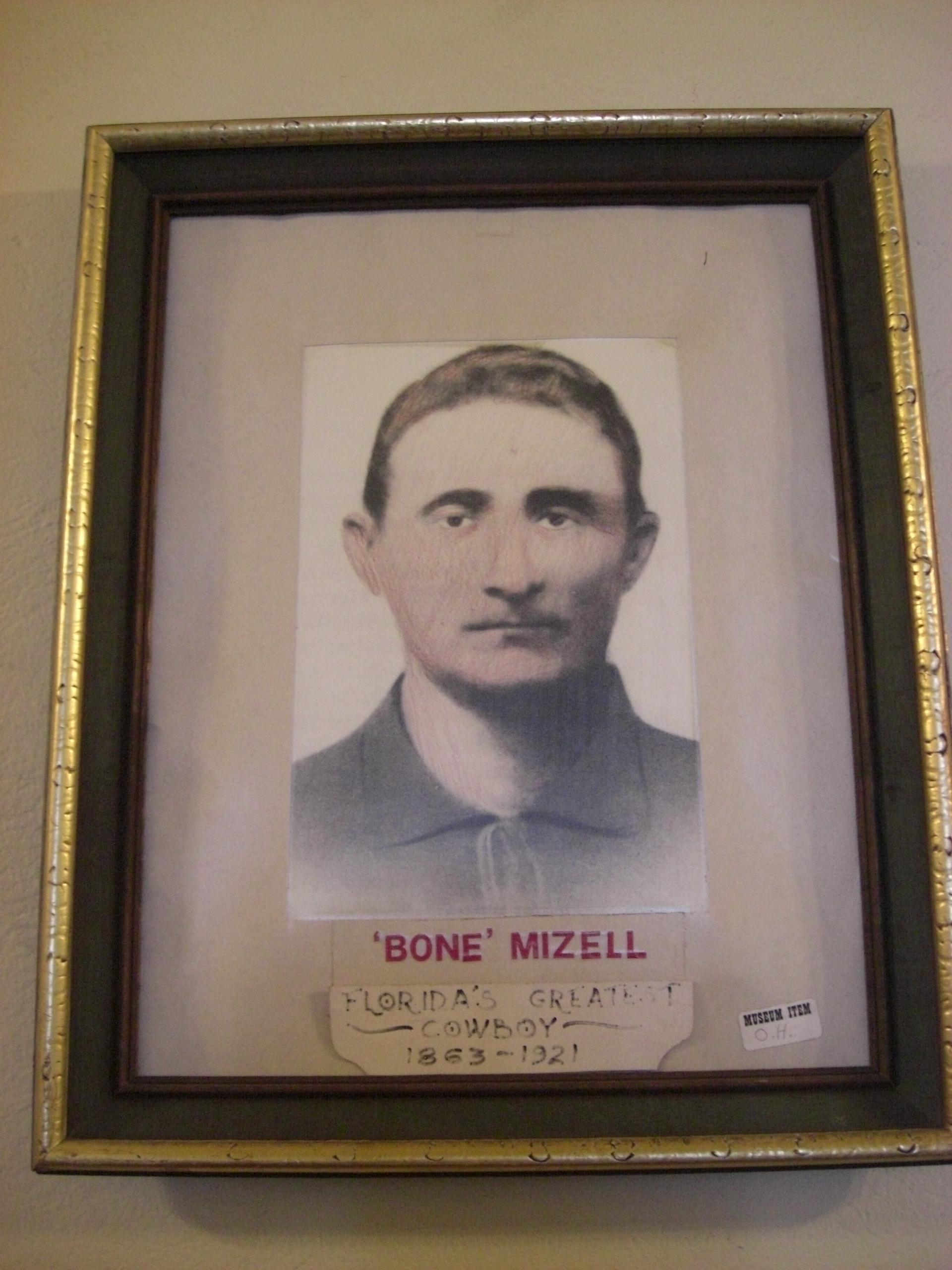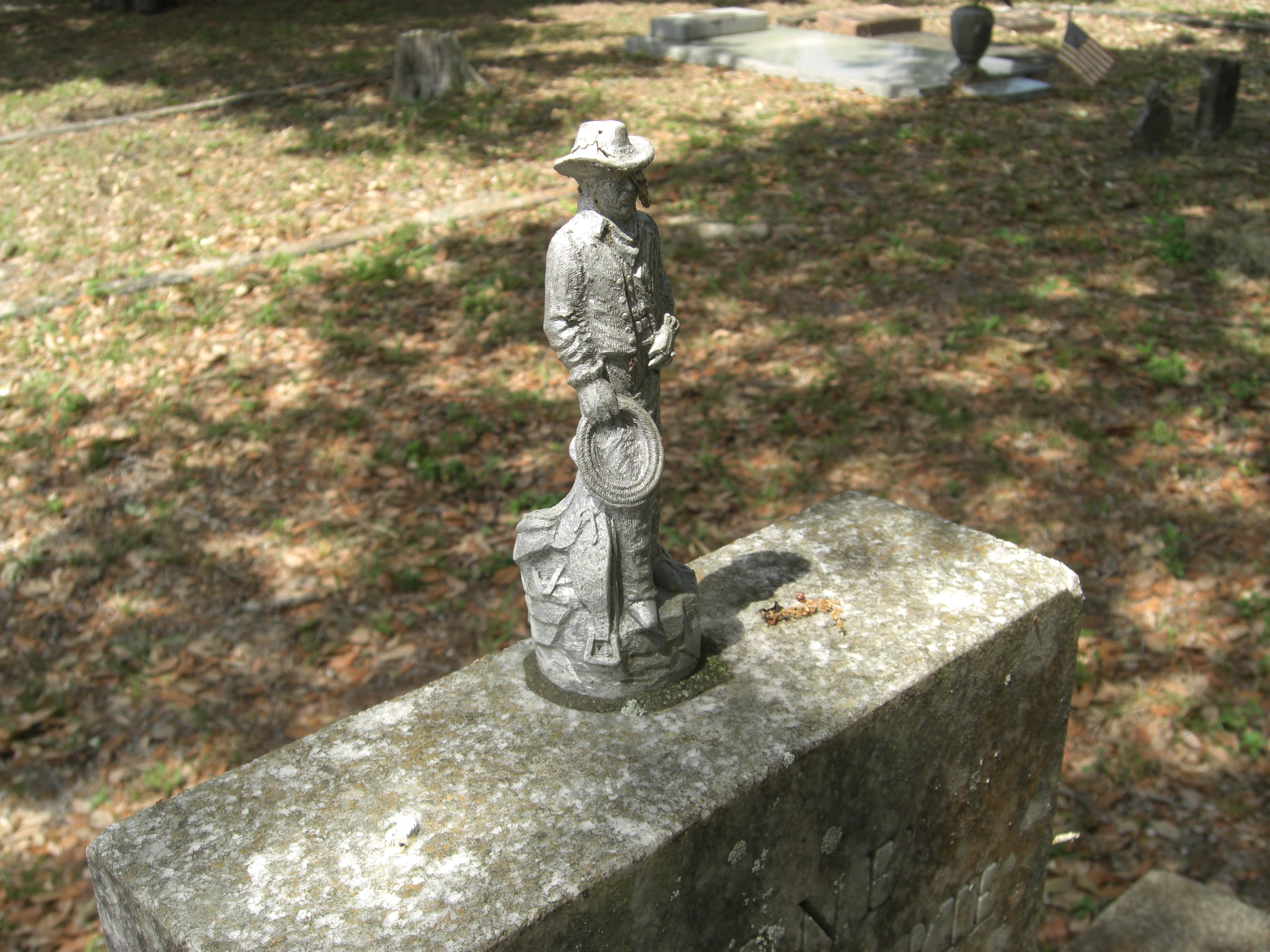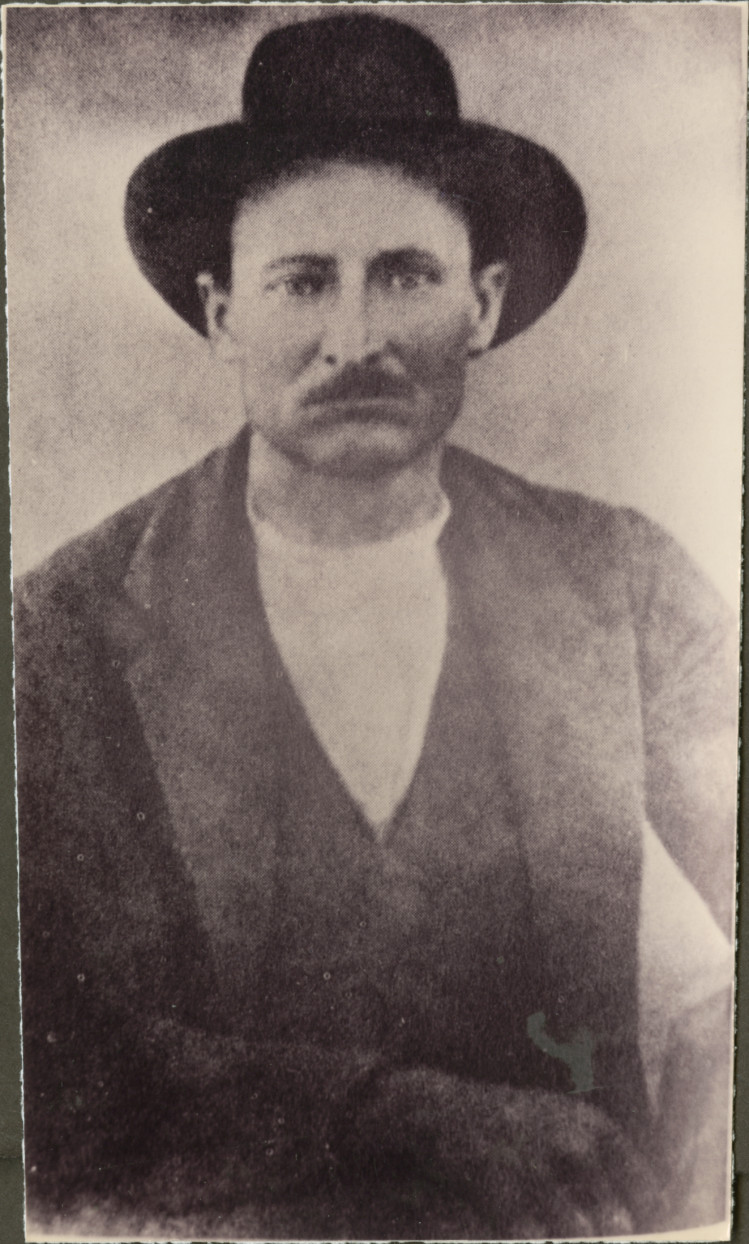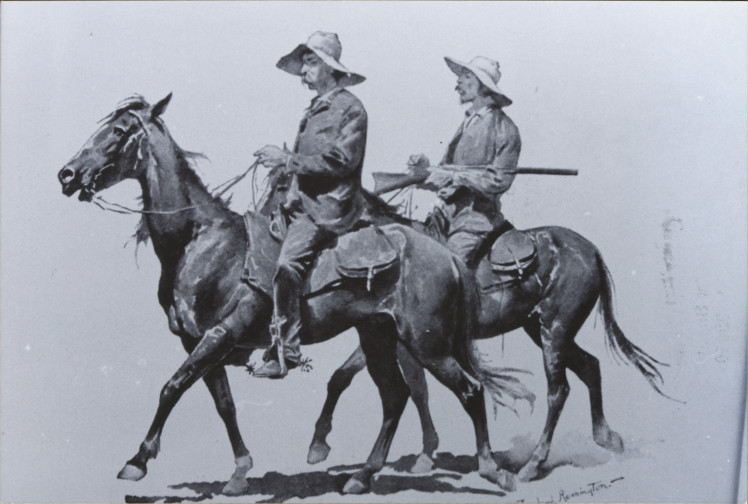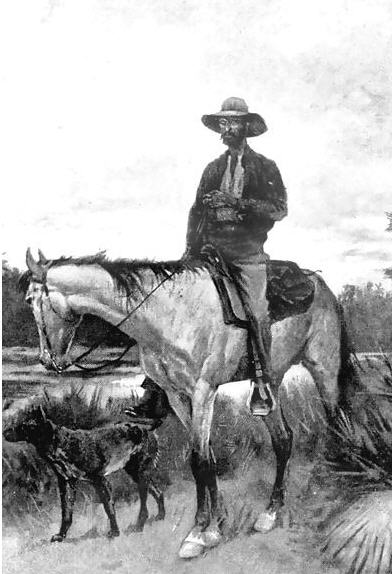On July 14, 1921, Morgan Bonaparte Mizell, 58, died with his boots on lying in the telegraph office waiting for money. The signature of L.L. Morgan, brother of the depot agent and the local undertaker, was the only one on Bone's death certificate. Where it asked the 'cause of death,' the certificate read: 'Moonshine-went to sleep and did not wake up.'
He was the eighth of 12 children for Morgan Mizell and Mary Fletcher Tucker. Bone's daddy much admired the diminutive French Emperor Napoleon Bonaparte, so he saddled his new son with the fancy name of Morgan Bonaparte Mizell. That's where the comparison ended, however. Napoleon was just over 5 feet tall; Bone was nearly 6 feet 5.
Bone could ride his small, Florida-bred horse-called a Marsh Tackie-with the easy grace of a circus rider. He could just as gracefully flick a fly off a cow's rump with his 18-foot bullwhip, never raising a hair on the poor dumb beast.
The urbane Remington traveled from New York City to Florida to paint the scruffy-looking Mizell astride his horse. Remington called the painting A Cracker Cowboy. Other paintings of Bone and his cowboy colleagues appeared in the August 1895 issue of Harper's New Monthly Magazine. The appellation stuck. Eventually it evolved into Florida Cracker, the title now reserved for the Sunshine State's native-born sons and daughters.
Bone never married, but was a sure-fire favorite in the bordellos of the Florida cow towns that flourished after the Civil War. Since he never owned a home, he rarely slept in a bed-unless it was in a
bordello.
Bone was lean, mean and loquacious-faulted at times for being too funny, too frolicsome, too fractious. This was particularly true when he was drinking, which was most of the time. Tales of his drinking were as legendary as those of his pranks.
A Florida lady named Ruby Leach Carson penned the 'Ballad of Bone Mizell', later set to music by Jim Bob Tinsley and his wife, Dottie.
A legend in south Florida, "Bone" Mizell died at the Fort Ogden train depot and is buried at Joshua Creek Cemetery near Arcadia. His grave marker contains several errors; his first name was Morgan, not Napolean, as some people assumed; his year of birth was 1863, not 1853; and although the family name was spelled with an "E" on the end, Bone spelled it without the final "E." The marker was at first erected on the wrong grave; his family had it relocated to the proper site but did not have any of the errors corrected.
Contributors
U.S. Cleveland
Charlotte County Historical Center
∼One of the most colorful characters in early Desoto County was "Bone" Mizell. He was born in 1863 in the Horse Creek settlement in Manatee County. His father, Morgan, and his uncle Enoch were early pioneers of the area. His mother was Mary Flecher Tucker.
Bone worked in the cattle industry most of his life, first for his father, then worked at various times for cattle baron, Eli O. Morgan, the Parker Brothers, and was forman for Ziba king. He worked the cattle ranges that stretched from Orlando and south to the upper Everglades.
Bone was six feet tall, with a lean rawboned face that was tanned a deep brown, from all the years that he spent outdoors. It's said that he slept on the ground more than he ever slept in a bed. He spoke with a lisp and a slight wheeze, and was teased by his boyhood friends. He developed a sharp wit in defense and was a notorious prankster. Former Desoto County Sheriff, Les Dishong, once said that just the way he looked and talked made you laugh. Life-long Desoto resident, Gene Harn, said that "Bone didn't mean to be funny, it just came out that way."
He was uneducated, barely able to write his name, but he managed to keep accounts in his head and remembered dozens of cattle brands. He once owned a grocery store at Pine Level, but his easy going nature and generosity with friends and credit caused him to finally close the store and go back to what he loved the most, riding the range.
Bone was a hard drinking man, and knew that one day it would be the death of him. One night after the drink had gotten the best of him, a group of cowboys carried him to a cemetery and left him laying among the gravestones. When Bone woke up the next morning, he looked around, and said, "Here it is Judgment Day, and I'm the first one up."
One night he was at a poker game at the Hollingsworth's home with Zeb Parker, Russell King, A. C. Williams, Maury and A. P. Hollingsworth. Sheriff Les Dishong showed up and told them they were under arrest. One of the players said they were not playing for money, just poker chips. Sheriff Dishong said that was the same as money. The next morning in court, the players were fined eighty-five dollars. After everyone paid their fine, Bone came forward and dumped out eighty-five dollars worth of poker chips on the table. Dishong said, "Wait a minute, this ain't money." Bone replied, "You said it was yesterday."
By the late 1890's cattle rustling was rampant, and Bone was not immune to the lawlessness of the times. He was charged a number of times with rustling, altering brands and marking unmarked cattle and hogs, and it was rumored that he was stealing for a cattle king. In 1896 he was convicted and sentenced to two years in the state prison. A petition for his pardon was circulated by many of his friends, but they were told that he could not be pardoned until he actually served time. Bone was put on board a train with a brand new set of clothes, thanks to his friends, and a grand sendoff. He arrived at the prison, where the warden gave him a tour of the facilities, and invited him to dinner. Thus, having served time, he was pardoned, and Bone took the next train home.
On July 13, 1921, Bone spent the night at Joshua Creek, at the home of his friend, Leslie H. (Les) Avant. The next day he left for Arcadia by train for Fort Ogden, arriving at the village depot about eleven in the morning. He sent a wire to the Lykes Brothers in Tampa for some money, then lay down on a couch in the depot. Robert Morgan, son of E. H. Morgan, the agent for the Atlantic Coast Line Railway, said that he was worried about Bone, and asked him to sit up. Bone did so, and remarked that, "Yeah, I'd better not lay down, I might die." Robert left for lunch and when he returned found Bone lying dead on the floor. Dr. Aurin was called and pronounced Bone dead. A fellow asked him how he knew that, the doctor hadn't tested him. Dr. Aurin said, "I don't have to test him, I know that right now Old Bone would test a good 90 proof." The undertaker, L. L. Morgan entered the cause of death as "Moonshine---went to sleep and did not wake up."
Napoleon Bonaparte "Bone" Mizell's funeral was held the next day at the home of his nephew, Jesse Mizell Jr., and he was buried at Joshua Creek Cemetery. He was fifty-eight years old. His pallbearers were Leonard Smith, Henry Avant, J. M. Alderman, W. H. Seward, Paul Spear, and Hooker Parker.
The famed painter, Frederic Remeington, visited the area in 1885, where he documented the cowboys everyday life. One painting shows Bone on his horse, with his dog beside them.
Bone Mizelle never married
∼One of the most colorful characters in early Desoto County was "Bone" Mizell. He was born in 1863 in the Horse Creek settlement in Manatee County. His father, Morgan, and his uncle Enoch were early pioneers of the area. His mother was Mary Flecher Tucker.
Bone worked in the cattle industry most of his life, first for his father, then worked at various times for cattle baron, Eli O. Morgan, the Parker Brothers, and was forman for Ziba king. He worked the cattle ranges that stretched from Orlando and south to the upper Everglades.
Bone was six feet tall, with a lean rawboned face that was tanned a deep brown, from all the years that he spent outdoors. It's said that he slept on the ground more than he ever slept in a bed. He spoke with a lisp and a slight wheeze, and was teased by his boyhood friends. He developed a sharp wit in defense and was a notorious prankster. Former Desoto County Sheriff, Les Dishong, once said that just the way he looked and talked made you laugh. Life-long Desoto resident, Gene Harn, said that "Bone didn't mean to be funny, it just came out that way."
He was uneducated, barely able to write his name, but he managed to keep accounts in his head and remembered dozens of cattle brands. He once owned a grocery store at Pine Level, but his easy going nature and generosity with friends and credit caused him to finally close the store and go back to what he loved the most, riding the range.
Bone was a hard drinking man, and knew that one day it would be the death of him. One night after the drink had gotten the best of him, a group of cowboys carried him to a cemetery and left him laying among the gravestones. When Bone woke up the next morning, he looked around, and said, "Here it is Judgment Day, and I'm the first one up."
One night he was at a poker game at the Hollingsworth's home with Zeb Parker, Russell King, A. C. Williams, Maury and A. P. Hollingsworth. Sheriff Les Dishong showed up and told them they were under arrest. One of the players said they were not playing for money, just poker chips. Sheriff Dishong said that was the same as money. The next morning in court, the players were fined eighty-five dollars. After everyone paid their fine, Bone came forward and dumped out eighty-five dollars worth of poker chips on the table. Dishong said, "Wait a minute, this ain't money." Bone replied, "You said it was yesterday."
By the late 1890's cattle rustling was rampant, and Bone was not immune to the lawlessness of the times. He was charged a number of times with rustling, altering brands and marking unmarked cattle and hogs, and it was rumored that he was stealing for a cattle king. In 1896 he was convicted and sentenced to two years in the state prison. A petition for his pardon was circulated by many of his friends, but they were told that he could not be pardoned until he actually served time. Bone was put on board a train with a brand new set of clothes, thanks to his friends, and a grand sendoff. He arrived at the prison, where the warden gave him a tour of the facilities, and invited him to dinner. Thus, having served time, he was pardoned, and Bone took the next train home.
On July 13, 1921, Bone spent the night at Joshua Creek, at the home of his friend, Leslie H. (Les) Avant. The next day he left for Arcadia by train for Fort Ogden, arriving at the village depot about eleven in the morning. He sent a wire to the Lykes Brothers in Tampa for some money, then lay down on a couch in the depot. Robert Morgan, son of E. H. Morgan, the agent for the Atlantic Coast Line Railway, said that he was worried about Bone, and asked him to sit up. Bone did so, and remarked that, "Yeah, I'd better not lay down, I might die." Robert left for lunch and when he returned found Bone lying dead on the floor. Dr. Aurin was called and pronounced Bone dead. A fellow asked him how he knew that, the doctor hadn't tested him. Dr. Aurin said, "I don't have to test him, I know that right now Old Bone would test a good 90 proof." The undertaker, L. L. Morgan entered the cause of death as "Moonshine---went to sleep and did not wake up."
Napoleon Bonaparte "Bone" Mizell's funeral was held the next day at the home of his nephew, Jesse Mizell Jr., and he was buried at Joshua Creek Cemetery. He was fifty-eight years old. His pallbearers were Leonard Smith, Henry Avant, J. M. Alderman, W. H. Seward, Paul Spear, and Hooker Parker.
The famed painter, Frederic Remeington, visited the area in 1885, where he documented the cowboys everyday life. One painting shows Bone on his horse, with his dog beside them.
Bone Mizelle never married
On July 14, 1921, Morgan Bonaparte Mizell, 58, died with his boots on lying in the telegraph office waiting for money. The signature of L.L. Morgan, brother of the depot agent and the local undertaker, was the only one on Bone's death certificate. Where it asked the 'cause of death,' the certificate read: 'Moonshine-went to sleep and did not wake up.'
He was the eighth of 12 children for Morgan Mizell and Mary Fletcher Tucker. Bone's daddy much admired the diminutive French Emperor Napoleon Bonaparte, so he saddled his new son with the fancy name of Morgan Bonaparte Mizell. That's where the comparison ended, however. Napoleon was just over 5 feet tall; Bone was nearly 6 feet 5.
Bone could ride his small, Florida-bred horse-called a Marsh Tackie-with the easy grace of a circus rider. He could just as gracefully flick a fly off a cow's rump with his 18-foot bullwhip, never raising a hair on the poor dumb beast.
The urbane Remington traveled from New York City to Florida to paint the scruffy-looking Mizell astride his horse. Remington called the painting A Cracker Cowboy. Other paintings of Bone and his cowboy colleagues appeared in the August 1895 issue of Harper's New Monthly Magazine. The appellation stuck. Eventually it evolved into Florida Cracker, the title now reserved for the Sunshine State's native-born sons and daughters.
Bone never married, but was a sure-fire favorite in the bordellos of the Florida cow towns that flourished after the Civil War. Since he never owned a home, he rarely slept in a bed-unless it was in a
bordello.
Bone was lean, mean and loquacious-faulted at times for being too funny, too frolicsome, too fractious. This was particularly true when he was drinking, which was most of the time. Tales of his drinking were as legendary as those of his pranks.
A Florida lady named Ruby Leach Carson penned the 'Ballad of Bone Mizell', later set to music by Jim Bob Tinsley and his wife, Dottie.
A legend in south Florida, "Bone" Mizell died at the Fort Ogden train depot and is buried at Joshua Creek Cemetery near Arcadia. His grave marker contains several errors; his first name was Morgan, not Napolean, as some people assumed; his year of birth was 1863, not 1853; and although the family name was spelled with an "E" on the end, Bone spelled it without the final "E." The marker was at first erected on the wrong grave; his family had it relocated to the proper site but did not have any of the errors corrected.
Contributors
U.S. Cleveland
Charlotte County Historical Center
∼One of the most colorful characters in early Desoto County was "Bone" Mizell. He was born in 1863 in the Horse Creek settlement in Manatee County. His father, Morgan, and his uncle Enoch were early pioneers of the area. His mother was Mary Flecher Tucker.
Bone worked in the cattle industry most of his life, first for his father, then worked at various times for cattle baron, Eli O. Morgan, the Parker Brothers, and was forman for Ziba king. He worked the cattle ranges that stretched from Orlando and south to the upper Everglades.
Bone was six feet tall, with a lean rawboned face that was tanned a deep brown, from all the years that he spent outdoors. It's said that he slept on the ground more than he ever slept in a bed. He spoke with a lisp and a slight wheeze, and was teased by his boyhood friends. He developed a sharp wit in defense and was a notorious prankster. Former Desoto County Sheriff, Les Dishong, once said that just the way he looked and talked made you laugh. Life-long Desoto resident, Gene Harn, said that "Bone didn't mean to be funny, it just came out that way."
He was uneducated, barely able to write his name, but he managed to keep accounts in his head and remembered dozens of cattle brands. He once owned a grocery store at Pine Level, but his easy going nature and generosity with friends and credit caused him to finally close the store and go back to what he loved the most, riding the range.
Bone was a hard drinking man, and knew that one day it would be the death of him. One night after the drink had gotten the best of him, a group of cowboys carried him to a cemetery and left him laying among the gravestones. When Bone woke up the next morning, he looked around, and said, "Here it is Judgment Day, and I'm the first one up."
One night he was at a poker game at the Hollingsworth's home with Zeb Parker, Russell King, A. C. Williams, Maury and A. P. Hollingsworth. Sheriff Les Dishong showed up and told them they were under arrest. One of the players said they were not playing for money, just poker chips. Sheriff Dishong said that was the same as money. The next morning in court, the players were fined eighty-five dollars. After everyone paid their fine, Bone came forward and dumped out eighty-five dollars worth of poker chips on the table. Dishong said, "Wait a minute, this ain't money." Bone replied, "You said it was yesterday."
By the late 1890's cattle rustling was rampant, and Bone was not immune to the lawlessness of the times. He was charged a number of times with rustling, altering brands and marking unmarked cattle and hogs, and it was rumored that he was stealing for a cattle king. In 1896 he was convicted and sentenced to two years in the state prison. A petition for his pardon was circulated by many of his friends, but they were told that he could not be pardoned until he actually served time. Bone was put on board a train with a brand new set of clothes, thanks to his friends, and a grand sendoff. He arrived at the prison, where the warden gave him a tour of the facilities, and invited him to dinner. Thus, having served time, he was pardoned, and Bone took the next train home.
On July 13, 1921, Bone spent the night at Joshua Creek, at the home of his friend, Leslie H. (Les) Avant. The next day he left for Arcadia by train for Fort Ogden, arriving at the village depot about eleven in the morning. He sent a wire to the Lykes Brothers in Tampa for some money, then lay down on a couch in the depot. Robert Morgan, son of E. H. Morgan, the agent for the Atlantic Coast Line Railway, said that he was worried about Bone, and asked him to sit up. Bone did so, and remarked that, "Yeah, I'd better not lay down, I might die." Robert left for lunch and when he returned found Bone lying dead on the floor. Dr. Aurin was called and pronounced Bone dead. A fellow asked him how he knew that, the doctor hadn't tested him. Dr. Aurin said, "I don't have to test him, I know that right now Old Bone would test a good 90 proof." The undertaker, L. L. Morgan entered the cause of death as "Moonshine---went to sleep and did not wake up."
Napoleon Bonaparte "Bone" Mizell's funeral was held the next day at the home of his nephew, Jesse Mizell Jr., and he was buried at Joshua Creek Cemetery. He was fifty-eight years old. His pallbearers were Leonard Smith, Henry Avant, J. M. Alderman, W. H. Seward, Paul Spear, and Hooker Parker.
The famed painter, Frederic Remeington, visited the area in 1885, where he documented the cowboys everyday life. One painting shows Bone on his horse, with his dog beside them.
Bone Mizelle never married
∼One of the most colorful characters in early Desoto County was "Bone" Mizell. He was born in 1863 in the Horse Creek settlement in Manatee County. His father, Morgan, and his uncle Enoch were early pioneers of the area. His mother was Mary Flecher Tucker.
Bone worked in the cattle industry most of his life, first for his father, then worked at various times for cattle baron, Eli O. Morgan, the Parker Brothers, and was forman for Ziba king. He worked the cattle ranges that stretched from Orlando and south to the upper Everglades.
Bone was six feet tall, with a lean rawboned face that was tanned a deep brown, from all the years that he spent outdoors. It's said that he slept on the ground more than he ever slept in a bed. He spoke with a lisp and a slight wheeze, and was teased by his boyhood friends. He developed a sharp wit in defense and was a notorious prankster. Former Desoto County Sheriff, Les Dishong, once said that just the way he looked and talked made you laugh. Life-long Desoto resident, Gene Harn, said that "Bone didn't mean to be funny, it just came out that way."
He was uneducated, barely able to write his name, but he managed to keep accounts in his head and remembered dozens of cattle brands. He once owned a grocery store at Pine Level, but his easy going nature and generosity with friends and credit caused him to finally close the store and go back to what he loved the most, riding the range.
Bone was a hard drinking man, and knew that one day it would be the death of him. One night after the drink had gotten the best of him, a group of cowboys carried him to a cemetery and left him laying among the gravestones. When Bone woke up the next morning, he looked around, and said, "Here it is Judgment Day, and I'm the first one up."
One night he was at a poker game at the Hollingsworth's home with Zeb Parker, Russell King, A. C. Williams, Maury and A. P. Hollingsworth. Sheriff Les Dishong showed up and told them they were under arrest. One of the players said they were not playing for money, just poker chips. Sheriff Dishong said that was the same as money. The next morning in court, the players were fined eighty-five dollars. After everyone paid their fine, Bone came forward and dumped out eighty-five dollars worth of poker chips on the table. Dishong said, "Wait a minute, this ain't money." Bone replied, "You said it was yesterday."
By the late 1890's cattle rustling was rampant, and Bone was not immune to the lawlessness of the times. He was charged a number of times with rustling, altering brands and marking unmarked cattle and hogs, and it was rumored that he was stealing for a cattle king. In 1896 he was convicted and sentenced to two years in the state prison. A petition for his pardon was circulated by many of his friends, but they were told that he could not be pardoned until he actually served time. Bone was put on board a train with a brand new set of clothes, thanks to his friends, and a grand sendoff. He arrived at the prison, where the warden gave him a tour of the facilities, and invited him to dinner. Thus, having served time, he was pardoned, and Bone took the next train home.
On July 13, 1921, Bone spent the night at Joshua Creek, at the home of his friend, Leslie H. (Les) Avant. The next day he left for Arcadia by train for Fort Ogden, arriving at the village depot about eleven in the morning. He sent a wire to the Lykes Brothers in Tampa for some money, then lay down on a couch in the depot. Robert Morgan, son of E. H. Morgan, the agent for the Atlantic Coast Line Railway, said that he was worried about Bone, and asked him to sit up. Bone did so, and remarked that, "Yeah, I'd better not lay down, I might die." Robert left for lunch and when he returned found Bone lying dead on the floor. Dr. Aurin was called and pronounced Bone dead. A fellow asked him how he knew that, the doctor hadn't tested him. Dr. Aurin said, "I don't have to test him, I know that right now Old Bone would test a good 90 proof." The undertaker, L. L. Morgan entered the cause of death as "Moonshine---went to sleep and did not wake up."
Napoleon Bonaparte "Bone" Mizell's funeral was held the next day at the home of his nephew, Jesse Mizell Jr., and he was buried at Joshua Creek Cemetery. He was fifty-eight years old. His pallbearers were Leonard Smith, Henry Avant, J. M. Alderman, W. H. Seward, Paul Spear, and Hooker Parker.
The famed painter, Frederic Remeington, visited the area in 1885, where he documented the cowboys everyday life. One painting shows Bone on his horse, with his dog beside them.
Bone Mizelle never married
Family Members
Sponsored by Ancestry
Advertisement
Explore more
Sponsored by Ancestry
Advertisement
